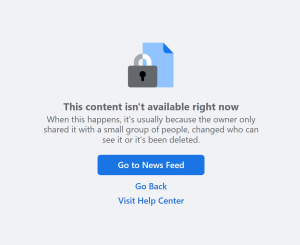The Facebook page belonging to Cambodia’s Prime Minister Hun Sen appears to have been deactivated, just hours after an independent watchdog recommended that it be suspended for breaching the platform’s policy on violence and incitement.
In a decision released yesterday, the Oversight Board of Facebook’s parent company Meta called for the Cambodian leader’s busy account to be suspended for six months over a livestreamed speech in which he threatened his opponents with violence.
The speech in question took place at a road construction ceremony in January, when the 70-year-old leader attacked opposition politicians who accused his ruling Cambodian People’s Party (CPP) of stealing votes. “There are only two options: one is using legal action, the other is using sticks… What do you want?” he said in the speech. “Either you face legal action in court or I rally CPP people for a demonstration and beat you guys up.”
In its decision yesterday, the Oversight Board, a panel of independent experts, overruled an earlier decision by Meta to allow the post to remain online, on the grounds that Hun Sen’s status as a national leader made his remarks newsworthy. The Board dismissed this logic, arguing that “the harm caused by allowing the content on the platform outweighs the post’s public interest value.”
The ruling has been applauded by rights activists.
“This kind of face-off between Big Tech and a dictator over human rights issues is long overdue,” Phil Robertson of Human Rights Watch said in an emailed statement. “The stakes are high because plenty of real world harm is caused when an authoritarian uses social media to incite violence – as we have already seen far too many times in Cambodia.”
Hun Sen has responded by announcing that he is abandoning Facebook for its competitor Telegram. Late on Thursday, Nikkei Asia reported, the Cambodian leader posted a message on his Telegram account, which he said was now his preferred way of communicating with the public because it was “more effective.”
“I have decided to stop using Facebook, on which I have more than 14 million followers,” he said, the publication quoted him as saying. “I have requested my assistant to delete my Facebook account immediately. And I will also inform the company to delete my name from Facebook.”
He did not reference the decision of the Oversight Board, claiming simply that Telegram is “more effective compared to Facebook.” Hun Sen joined the Russian messaging app in May 2022, and currently has around 850,000 subscribers. Hun Sen has also set up an account on the Chinese-owned social media network TikTok in a bid to appeal to Cambodia’s youth.
Taking their lead from Hun Sen, other senior officials and CPP-aligned tycoons appear to have followed suit and abandoned Facebook for TikTok and Telegram, just as they flocked to Facebook when Hun Sen embraced the platform in 2015. Indeed, in the coming weeks, powerful Cambodians’ choice of social media network could well become a test of loyalty to the long-serving Cambodian leader.
In some respects, Hun Sen’s social media pivot reflects the country’s broader foreign policy trajectory, which has seen it move away from Western nations that have made “unwelcome” demands regarding good governance and democratic reforms, and toward more “supportive” partners including China. In both cases, the tightening of democratic standards by Western entities has prompted a flight to more freewheeling Chinese and Russian alternatives.
Whether these alternative platforms will offer Hun Sen a true substitute for Facebook, which remains the social media network of choice for ordinary Cambodians, remains to be seen.

































